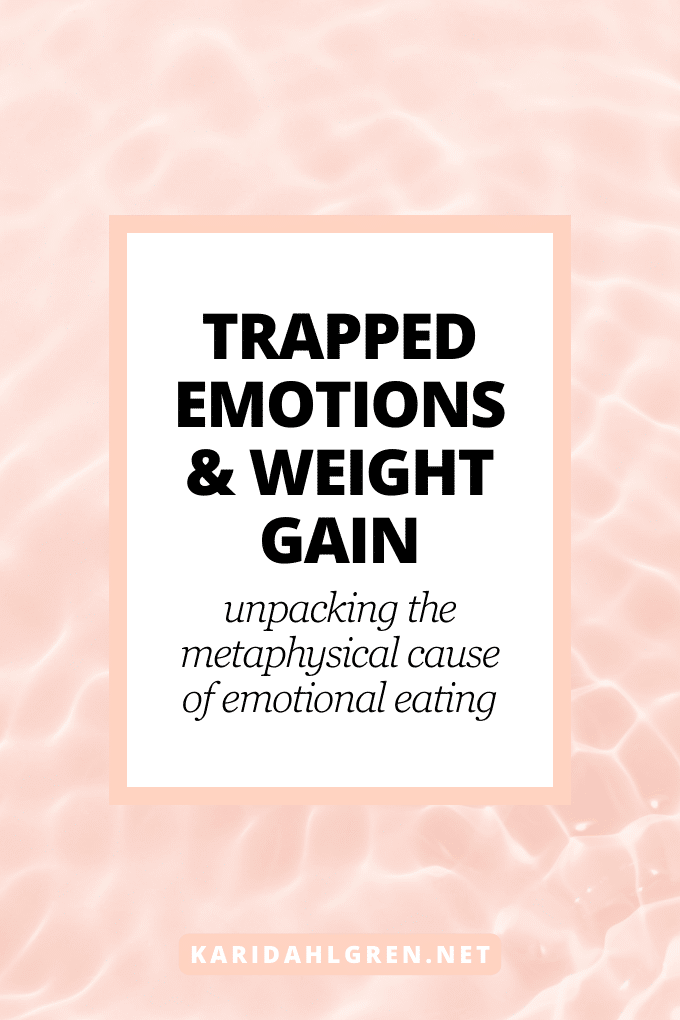
The link between trapped emotions and weight gain can feel like a frustrating cycle—one that’s hard to see clearly, let alone break. But with the right blend of emotional awareness and practical tools, it’s possible to release what’s been weighing you down—physically, emotionally, and energetically.
As a National Board-Certified Health & Wellness Coach and medical writer with a decade of experience translating clinical research, I approach this topic with both curiosity and care. We’ll explore how metaphysical theory intersects with evidence-based psychology to shed light on why emotions get “stuck” and how that can lead to a cycle of trapped emotions and weight gain.
We’ll begin by exploring why emotions get trapped in the first place—and then walk through practical tools to help you release them. As you create more emotional space, your relationship with your body may begin to shift too—not through force, but through safety and self-trust.
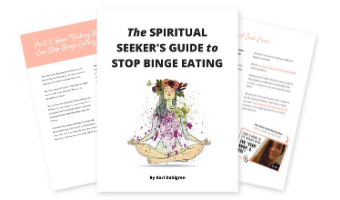
Intrigued by the connection between spirituality and eating behavior? You're in the right place! Dive even deeper by downloading my free ebook, The Spiritual Seeker's Guide to Stop Binge Eating.
Where Is the Link Between Trapped Emotions and Weight Gain?
Negative emotions are a normal part of life. In fact, they can be signs that we’re living fully—taking risks, setting boundaries, being vulnerable. These are all things that carry emotional exposure, which means sometimes we’ll get hurt. But that doesn’t mean we’re doing anything wrong. It often means we’re growing.
Still, in our social media–driven world, the emotional landscape gets distorted. We’re flooded with highlight reels—images of joy, success, and “clean” living—while pain, grief, and struggle are often hidden or edited out. This cultural pressure to always be happy can lead to emotional suppression. And when we sidestep our difficult feelings, we risk trapping them in the body instead of processing and releasing them.
As Karol Truman famously said, “Feelings buried alive never die.”
When emotions remain unprocessed, they linger under the surface, disrupting our sense of internal safety and potentially influencing everything from our food choices to how we feel in our bodies.
This emotional suppression often starts early. According to research published in Annual Review of Clinical Psychology, emotion-related self-regulation develops rapidly in early childhood but continues refining well into adulthood.[1]
If you grew up in a home where difficult emotions weren’t allowed—where crying, anger, or sadness were minimized or punished—you may have learned to disconnect from your feelings instead of working through them. While it’s possible to relearn emotional regulation later in life, it takes intentional effort and practice.
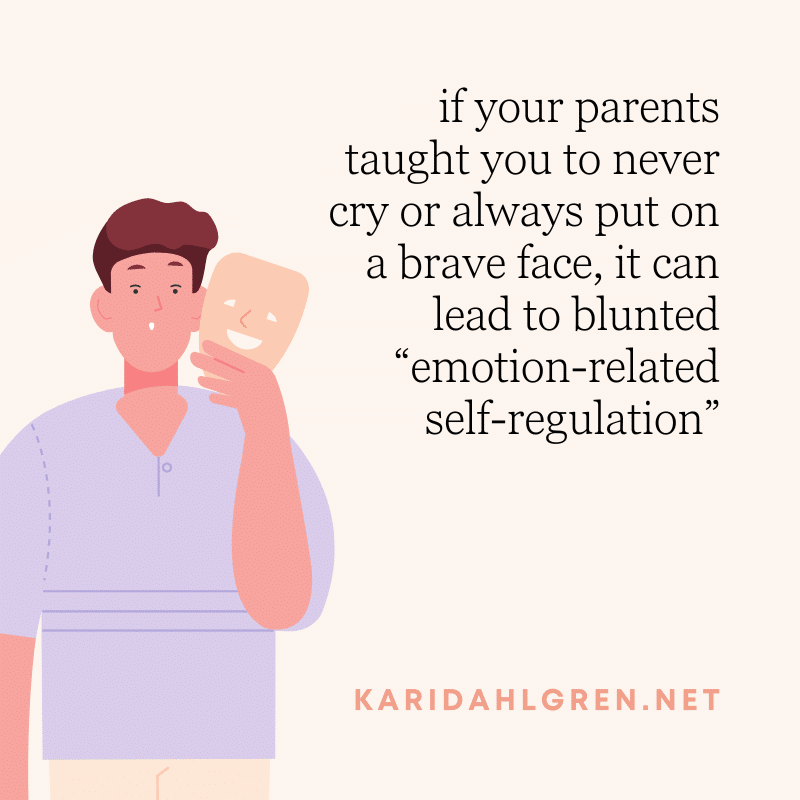
For many people, food becomes a coping tool when emotional processing feels unsafe or unfamiliar. Emotional eating can then turn into a way to manage discomfort—not just from day-to-day stressors, but from long-held, unacknowledged emotional pain. Over time, this pattern can contribute to trapped emotions and weight gain, especially when eating becomes a primary outlet for unmet emotional needs.
And if weight gain itself becomes a source of distress, the cycle can deepen. Research has found that “feeling fat”—a subjective emotional state, not a measure of actual weight—is strongly associated with depression, shame, and fear of negative evaluation.[2] These emotions can fuel more emotional eating and reinforce feelings of being stuck in your body and stuck in your patterns.
But there is a way forward—one that doesn’t rely on willpower or self-punishment, but on emotional fluency, self-compassion, and nervous system safety.
Louise Hay’s Thoughts on Trapped Emotions and Weight Gain
This brings us to the wisdom of Louise Hay, a pioneer in metaphysical healing. In her book Heal Your Body, Hay suggests that every physical ailment has a metaphysical root—and when it comes to weight gain, she points to oversensitivity, fear, and a need for protection.
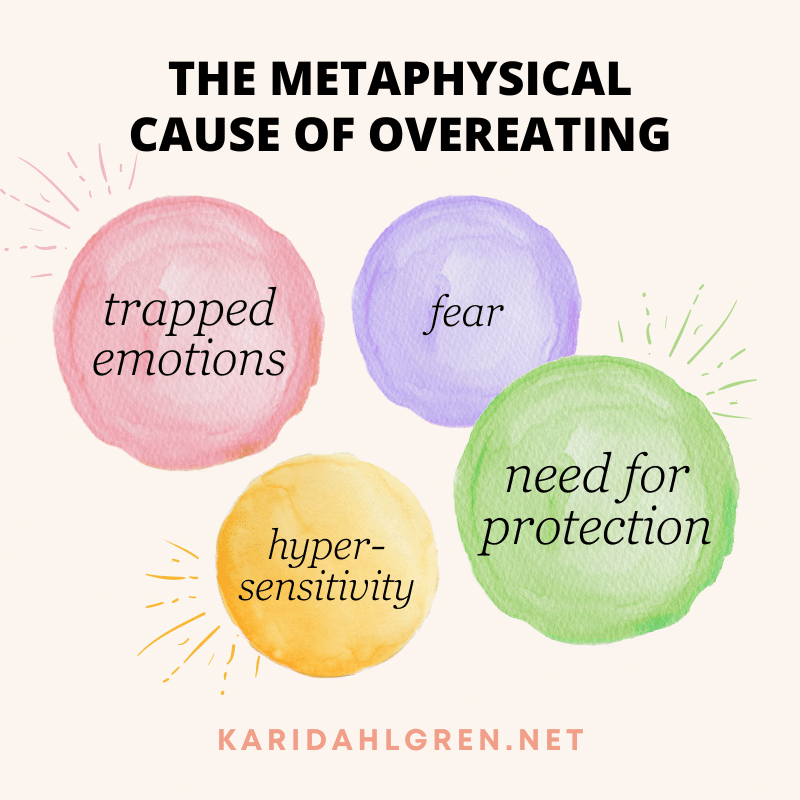
For many, this resonates deeply. Extra weight can feel like body armor—an unconscious way of buffering ourselves from emotional overwhelm, criticism, or vulnerability. This is one of the core ideas I unpack more fully in the spiritual root of weight gain, where I explore how weight gain can serve as a protective mechanism when the nervous system doesn’t feel safe.
And that instinct isn’t just metaphorical. According to a study published in Physiology & Behavior, individuals with lower heart rate variability—a sign of nervous system dysregulation—are more likely to engage in loss-of-control eating.[3] In other words, when the nervous system perceives danger, even emotional danger, it can drive us to seek immediate relief through food.
Let’s say you identify as someone who’s emotionally attuned—sensitive to subtle changes in mood or energy. If you get into an argument with your partner, your drive to keep the peace might cause you to suppress your feelings. But emotions don’t disappear just because we ignore them. When there’s no safe outlet, the nervous system stays activated, and food can become a shortcut to regulation.
This is how the cycle of trapped emotions and weight gain can start to take shape: unprocessed emotions create internal chaos, the nervous system loses its sense of safety, and food steps in as a stabilizer.
Metaphysical teachings echo this idea. Blocked energy—especially in the chakras—is believed to cause both emotional and physical imbalance. When emotions are left unprocessed, they can obstruct the body’s energy flow, contributing to distress around food and body. It’s a reminder that for many, there’s a spiritual meaning of overeating—a deeper message behind the compulsion that’s asking to be seen, not silenced.
These perspectives don’t replace science—they enhance it. When we begin to see weight and eating patterns as messages from the body, not just problems to fix, healing becomes more holistic and sustainable.
Continue your journey into the metaphysical: If you’re interested in the metaphysical, then you’ll LOVE my free ebook, The Spiritual Seeker’s Guide to Stop Binge Eating. It explores the intersection between spirituality and eating psychology, just like this article.
How to Release Trapped Emotions and Weight Gain
Releasing trapped emotions isn’t really about controlling your weight—it’s about restoring emotional safety. It’s about learning how to be with your feelings instead of pushing them down with food. And when you do that, your internal world becomes calmer. Food stops feeling like the only way to cope. And your body finally gets to exhale.
There are two core skills that help facilitate this kind of change: emotional awareness and emotional tolerance. Together, they form the foundation of emotional regulation—and they can be learned and strengthened over time.
Emotional Awareness: The First Step Toward Emotional Freedom
Emotional awareness is the ability to recognize and name what you’re feeling in the moment. While that might sound simple, many people struggle with it—especially if they grew up in environments where difficult emotions were minimized or invalidated.
In fact, a 2021 study on binge eating disorder found that people who binge often report emotional confusion and a lack of clarity around their feelings—making it harder to respond to their needs in a grounded way.[4] Other research shows that emotional awareness supports better physical and mental health overall, including more satisfying relationships and improved self-regulation.[5]
Emotional awareness is powerful because, among many other benefits, it strengthens interoception—your ability to perceive internal bodily cues like hunger, fullness, and emotional shifts.
A 2013 study published in Appetite found that people with stronger interoceptive sensitivity were more likely to eat for physical rather than emotional reasons, and they had a healthier relationship with food and body weight.[6]
To build emotional awareness and interoceptive sensitivity, try making space throughout the day to check in with yourself—not to analyze, just to notice. What’s present in your body right now? Can you name the feeling, even if it’s vague? This gentle noticing begins to rewire your internal response system and lays the groundwork for emotional safety.
Emotional Tolerance: Staying Present Without Shutting Down
Once you can name what you feel, the next challenge is staying with the discomfort without shutting it down or reaching for food to numb it. This is where emotional tolerance comes in—and like awareness, it’s a skill you can build.
If your early environment didn’t support healthy emotional processing, you’re not broken—and you’re not stuck. Research shows that emotional regulation can absolutely be strengthened in adulthood, even if those foundations weren’t laid in childhood.[1] It begins with small, manageable moments of presence.
That’s what my Stop, Drop, & Feel® method is designed for. It’s a two-minute pause you take whenever you want to eat without physical hunger—not to resist the urge, but to explore what’s beneath it. With a timer set, you sit with the discomfort—just for a short window. It’s uncomfortable, yes, but it’s also how we teach the nervous system that emotional intensity doesn’t equal danger.

Over time, this micro-dose of emotional exposure builds resilience. Your nervous system learns that you don’t have to run from your feelings or soothe them with food. You can stay. You’re safe. And that kind of safety is what allows deeper change to take root.
Be gentle with yourself here. The emotions that surface in these moments—shame, loneliness, “feeling fat”—are often the sharpest. But they’re also the most revealing. As you increase your capacity to sit with them, even briefly, you cultivate self-trust—and that trust becomes the foundation for sustainable healing.
And while this work isn’t about shaming weight gain or idolizing weight loss, it is about shifting from self-criticism to self-compassion—an approach that can profoundly improve your relationship with food. In fact, a 2021 study found that self-compassion, not self-criticism, was linked to healthier eating behaviors and higher body esteem.[7]
In other words, the more grace you extend to yourself, the more naturally emotional regulation begins to emerge—and finally, the cycle of trapped emotions and weight gain can be broken.
Final Thoughts on Trapped Emotions and Weight Gain
This isn’t about willpower. It’s about disconnection. When emotions feel unsafe, food often steps in to help us cope. But healing is possible—not by fixing your body, but by building a new relationship with your inner world.
As you strengthen emotional awareness and tolerance, you create space for nervous system safety and self-trust. And with that, your relationship with food begins to shift—naturally, without force.


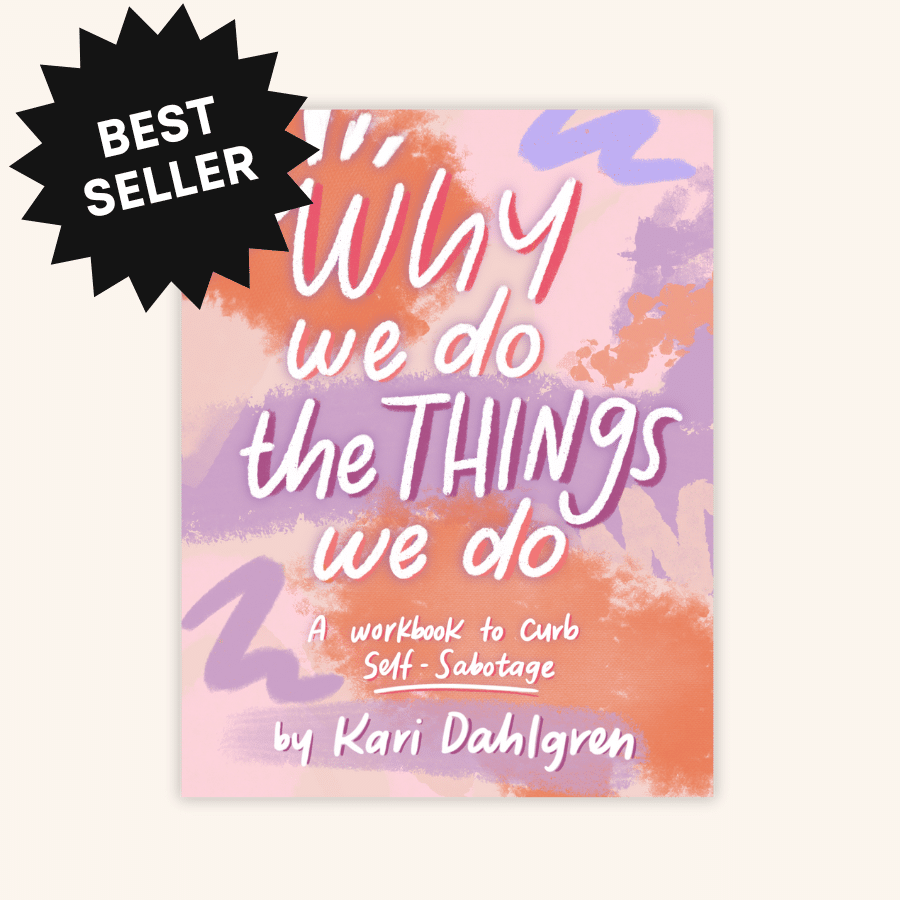
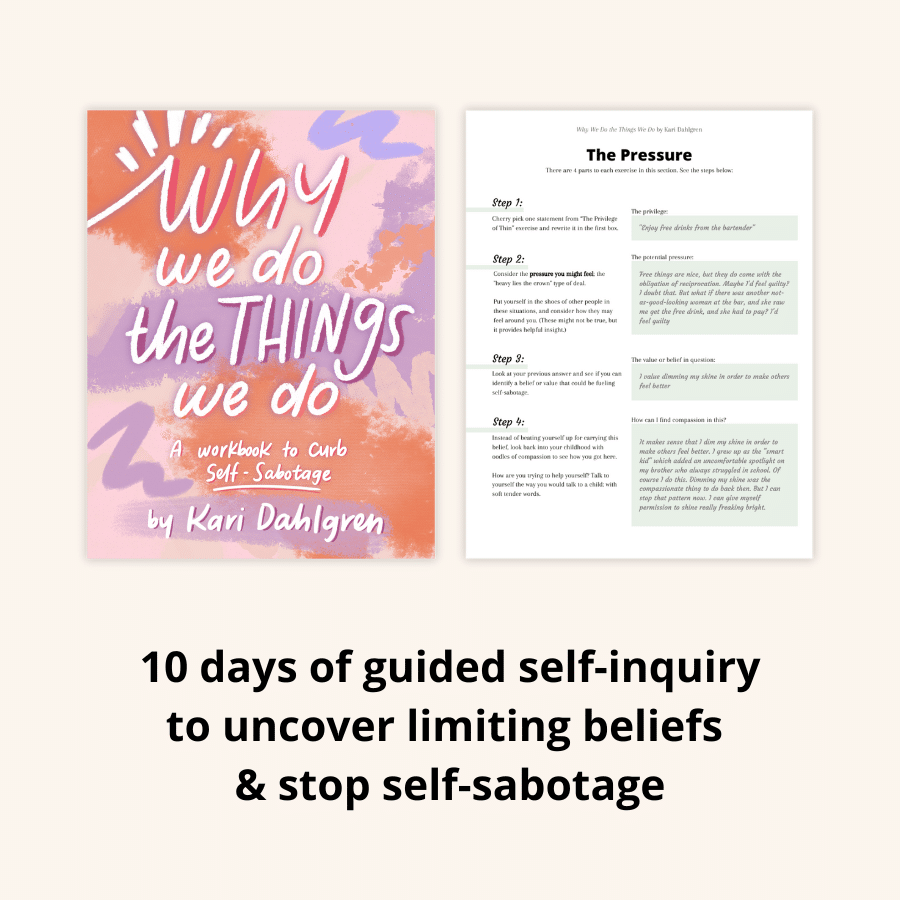
Love the video about feeling and eating. Thanks
Thanks for the wonderful feedback Teresa! I’m so glad this was helpful 🙂
This was so helpful. I know I have trapped emotions from family trauma and it’s reached a breakpoint. I’ve never been this heavy and no matter what I do with nutrition and exercise. The weight goes nowhere. It’s deeper than that. Thank you for the insight.
Thanks for taking the time to share your story, Claudia! I admire you for your willingness to look for answers in unexpected places, and I wish you much healing from what you have been through. Anyone who has dealt with trauma and still seeks to turn inward for healing is a very strong person to me!
So insightful
Thank you Dawn!